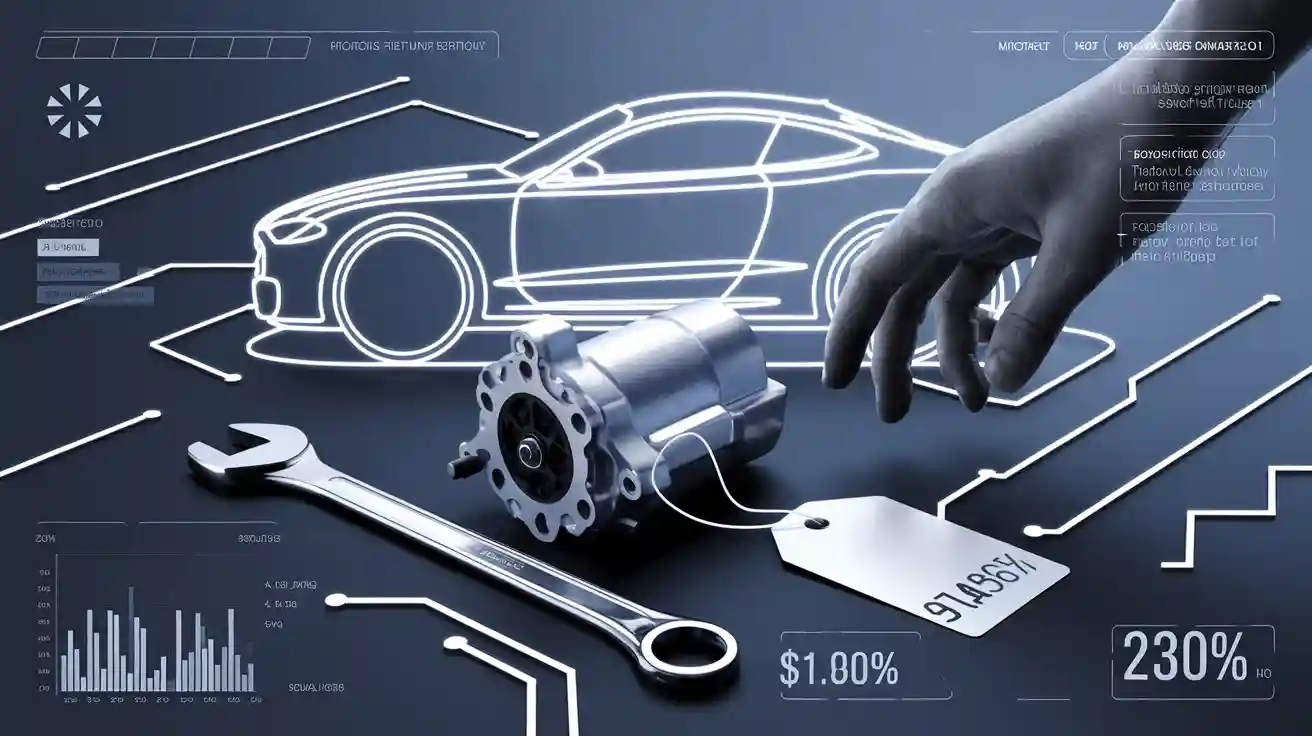
When you ask, "How much does a starter replacement cost?" you should expect to pay between $744 and $837 on average, according to recent Kelley Blue Book data. In some cases, the cost can rise to $1,500, especially for luxury vehicles or more complex jobs. The starter motor is a powerful electric component that uses your car battery's energy to turn the engine over and start your vehicle. Replacing the starter is crucial because a faulty starter can leave you stranded. Understanding how much a starter replacement costs helps you budget for repairs and avoid unexpected expenses. If you've been curious about the cost, learning about the starter motor and the factors that influence pricing will prepare you when it's time for service.
Starter Replacement Cost
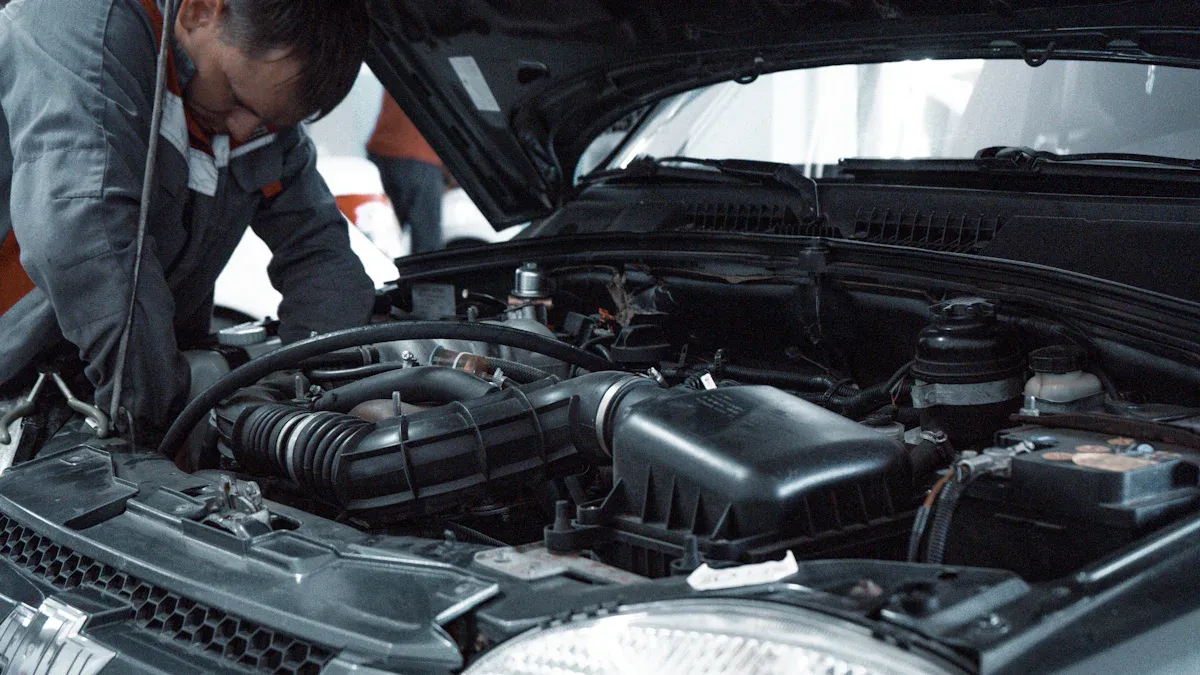
Image Source: unsplash
How Much Does a Starter Replacement Cost
When you wonder how much a starter replacement costs, prices can be very different. Most people pay between $508 and $820 for the whole job. Some repairs are as low as $200, but others can be $1,500 or more. The price changes based on your car, the starter's quality, and how hard the work is. For example, economy cars usually cost less. Luxury cars or trucks with hard-to-reach starters cost more.
You can buy starter motors at AutoZone and other stores for $80 to over $400. Cheaper starters do basic work. More expensive ones last longer and have extra features. Labor usually costs $150 to $350, but hard jobs can cost even more. Kelley Blue Book and RepairPal say these prices are the latest for 2025.
Tip: Always ask your mechanic for a full price list before you say yes to a starter replacement. This helps you avoid surprise bills and plan your money.
Parts and Labor Breakdown
Starter replacement has two main costs: the starter and the work to put it in. Here is a simple list:
Starter Parts:
New starters: $80–$400 (cheap to fancy)
OEM starters: $300–$600+
Aftermarket starters: $90–$350
Rebuilt starters: $50–$150 (can save money)
Labor:
Easy jobs: $100–$250 (1–2 hours)
Hard jobs: $300–$850+ (up to 8 hours for luxury or hard-to-reach starters)
Labor costs depend on how easy it is to get to the starter. Sedans and small cars usually have lower labor costs. Trucks, SUVs, and luxury cars often take more time and skill, so the price goes up.
Cost Component | Price Range |
|---|---|
$300 – $600+ | |
Aftermarket Starter | $90 – $350 |
Labor (1.5–4.5 hours) | $150 – $850 |
Total Replacement | $300 – $1,500 |
Cost by Vehicle Type
The price to replace a starter changes with your car type. Here is what you might pay:
Economy Cars:
These cars use simple starters and are easy to fix. You might pay $180 to $400 for parts and labor.Sedans (e.g., Honda Accord, Toyota Camry):
Starter replacement is cheaper because parts are not expensive and work is easy.Trucks and SUVs (e.g., Ford F-150, Chevrolet Silverado):
Starters are harder to reach, so labor costs more. Expect to pay $400 to $800.Luxury Vehicles (e.g., BMW 5 Series, Audi A6):
These cars need special starters and more work. The price can be $1,000 or more.
Cost Component | Economy Vehicle Range | Luxury Vehicle Range |
|---|---|---|
Starter Parts Cost | $80 - $150 | $250 - $400+ |
Labor Cost | $100 - $250 | $300 - $600+ |
Total Estimated Cost | $180 - $400 | $550 - $1,000+ |
Consumer Reports and AutoZone data say luxury cars cost more to fix because they have tricky designs and pricey parts.
Cost Table
You can look at starter replacement costs for different cars and starter types in this table:
Vehicle Type / Example | Parts Cost Range | Labor Cost Range | Total Cost Range |
|---|---|---|---|
Economy Starters (e.g., AutoZone) | $80 - $150 | $100 - $250 | $180 - $400 |
Mid-Range Vehicles (e.g., Honda Civic) | $150 - $250 | $144 - $250 | $294 - $500 |
Trucks (e.g., Ford F-150) | $200 - $319 | $150 - $350 | $350 - $669 |
Premium/Luxury (e.g., BMW 750i) | $250 - $735 | $300 - $741 | $550 - $1,476 |
Complex Luxury Vehicles | $450 - $2,500 | Up to $1,100+ | Up to $2,500+ |
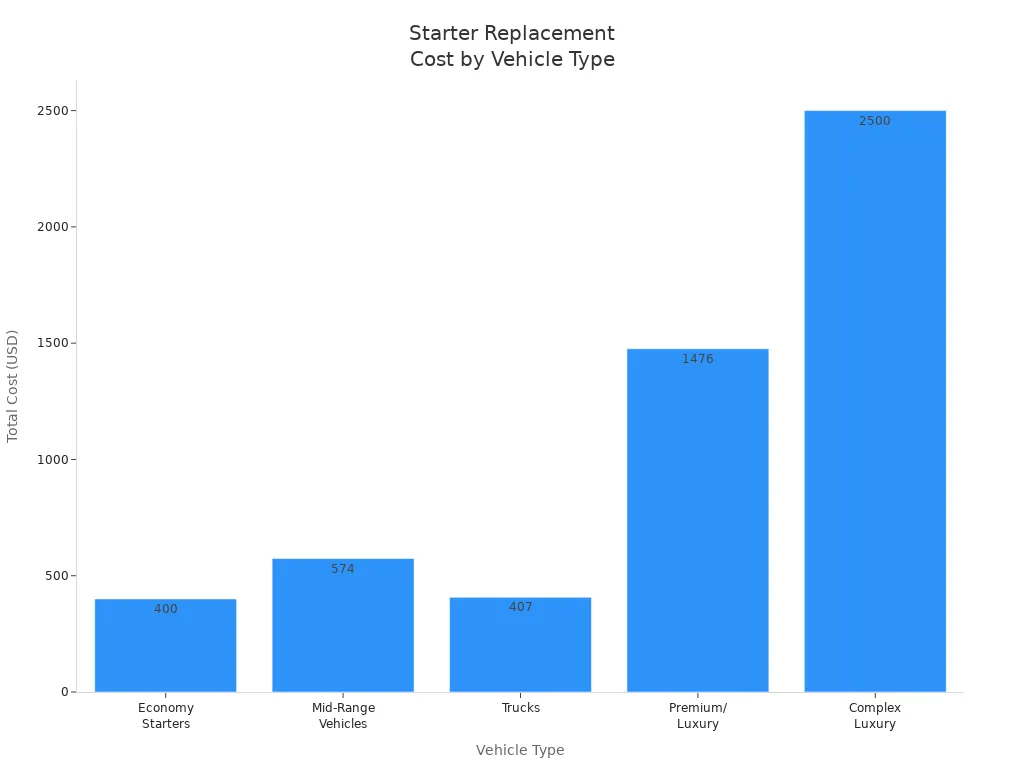
Note: Rebuilt starters can be as cheap as $50–$100, but always check the warranty and quality. Labor costs go up for cars with tight spaces or lots of electronics.
The main things that change starter replacement cost are the starter type, your car, and the work needed. Always get quotes from good shops and look at both new and rebuilt choices. This helps you keep starter replacement costs down and not pay too much.
The National Institute for Automotive Service Excellence (ASE) says regular checkups and fixing starter problems early can help you save money later.
Factors Affecting Starter Replacement Cost
Vehicle Make and Model
The kind of car you have changes the price a lot. Some cars have starters that are easy to get to. This makes the job faster and cheaper. Other cars, like SUVs or luxury cars, are harder to work on. Their engines are packed tight, so it takes more time. For example, a Honda Civic starter costs about $465 to $785. A Honda CR-V starter costs more, from $560 to $980. This is because the CR-V has a trickier design. If the starter is hard to reach or needs special parts, you pay more.
Vehicle Model | Average Starter Replacement Cost (USD) | Reason for Cost Variation |
|---|---|---|
$465 - $785 | Simpler starter design and easier access | |
$560 - $980 | More complex starter design and harder access |
Labor Complexity
Labor is a big part of the total cost. How long it takes depends on your car’s design. A 2011 Chevy Equinox LS 4-cylinder takes about 0.8 hours to fix. Some cars take 1 to 4 hours or even longer. Labor costs are usually $100 to $300 each hour. You might also pay extra for shop fees, taxes, or surprise repairs. If the job is harder, the price goes up.
Labor costs depend on:
The car you have
How long the job takes (1–4+ hours)
Hourly rates ($100–$300)
Extra parts, shop fees, and taxes
New vs Rebuilt Starters
You can pick a new starter or a rebuilt one. New starters cost more but are brand new and very reliable. Rebuilt starters are cheaper, about 30% to 50% less. They are tested to make sure they work well. Many people choose rebuilt starters to save money and help the environment. For most cars, the total cost is $600 to $900. For luxury cars, it can be up to $1,400. New starters are best if your car is still under warranty or you want it to last a long time.
Aspect | New Starter | Rebuilt (Remanufactured) Starter |
|---|---|---|
Price Difference | Baseline cost | 30% to 50% less than new starters |
Reliability | Brand new, no used parts | Highly reliable, strict quality testing |
Usage Recommendation | Best for warranty or peace of mind | Affordable, common for most replacements |
Location and Shop Type
Where you get your car fixed changes the price. Dealerships usually cost more than small shops. Certified shops may give better warranties but charge higher prices. Where you live also matters. Labor and parts cost more in some cities. RepairPal says you should check local prices before you decide. Some places cost more because of taxes or high demand. You can save money with a mobile mechanic. They may charge less and you won't need to pay for towing.
Tip: Always check prices at different shops near you. This helps you find the lowest price for your starter replacement.
Trusted sources like RepairPal and Consumer Reports say the main things that change the cost are your car, labor time, part type, and where you get the work done.
Repair vs Replace a Starter
Cost Comparison
If your starter has problems, you might ask if you should fix it or get a new one. The best choice depends on how bad the starter is, how much money you have, and how long you want the fix to last. Getting a new starter costs more at first, but it usually works better for a long time. Fixing or rebuilding a starter can save you money, especially if the problem is small.
Here is a simple chart to help you choose:
Aspect | Repairing (Rebuilding) Starter | Replacing with New Starter | Replacing with Remanufactured Starter |
|---|---|---|---|
Cost | Most expensive | Between rebuilt and new | |
Quality | Meets or exceeds OEM standards | All parts re-machined or replaced | |
Reliability | Comparable if rebuilt well | High reliability | Good reliability |
Warranty | Solid coverage | Comprehensive warranty | Generally good |
Turnaround Time | Often faster | May take longer | Moderate |
Environmental Impact | Eco-friendly | Less eco-friendly | Moderate |
Fixing a starter can almost cut the cost in half. Many local shops do good work, and rebuilt starters can last for years. If you buy a new starter, you pay more, but it is the most reliable and comes with a strong warranty. Remanufactured starters are in the middle for both price and quality.
Consumer Reports and RepairPal say that buying a new starter costs more, but you may not need more repairs soon.
Pros and Cons
You should think about the good and bad sides before you decide. Here are the main things experts talk about:
Aspect | Repair | Replacement |
|---|---|---|
Cost | Higher upfront cost | |
Longevity | May be a temporary fix | Long-term solution |
Parts Used | Quality varies by rebuilder | Quality parts recommended |
Time | Usually faster for minor issues | Longer process overall |
Fixing a starter is cheaper and can fix small problems fast.
Repairs might not last long if your starter is very old.
Getting a new starter costs more, but it should last a long time.
Experts from the National Institute for Automotive Service Excellence say to use good parts for both fixing and replacing.
A professional check can help you spend less and get the right fix.
Tip: If you find problems early and take care of your starter, you can make it last longer and spend less money.
When you think about how much a starter replacement costs, remember your car's age, your budget, and how long you want to keep your car. Trusted sources like Kelley Blue Book and RepairPal say getting a new starter is smart if your old one keeps breaking.
DIY Starter Replacement
How Much Does It Cost to Replace a Car Starter Yourself
You might wonder how much does it cost to replace a car starter on your own. Doing the job yourself can save you a lot of money. For most sedans, the parts for a new starter usually cost between $100 and $400. You will need some basic tools to get started. These include a socket set, ratchet, wrenches, torque wrench, screwdrivers, pry bar, pliers, and jack stands for safety. Many auto parts stores offer a Loan-A-Tool® program, so you can borrow tools instead of buying them.
Here is a quick breakdown of what you need:
Starter motor: $100–$400
Tools: Borrow or buy (cost varies)
Time: About one hour or more
You do not pay for labor when you do the work yourself. This means you keep more money in your pocket. According to Consumer Reports, many car owners choose DIY repairs to avoid high shop fees. If you want to learn how to replace a starter, you can find step-by-step guides online or in your vehicle’s manual.
Tip: Always disconnect the battery before you start. This keeps you safe and protects your car’s electronics.
Risks and When to Hire a Pro
Replacing a starter at home can be rewarding, but it comes with risks. Some vehicles have starters in hard-to-reach places. You may need to lift the car or remove other parts. If you make a mistake, you could damage the starter or other engine parts. The cost of replacing a car starter can go up if you need to fix extra problems.
You should hire a professional if:
The starter is hard to access
You do not have the right tools
You feel unsure about the steps
Your car is under warranty
Professional mechanics have the training and equipment to handle complex jobs. The National Institute for Automotive Service Excellence (ASE) recommends using a certified shop for vehicles with advanced electronics or tight engine spaces. This helps you avoid extra costs and keeps your car running smoothly.
Note: If you see signs of a bad starter, such as clicking noises or the engine not turning over, get a diagnosis before you start repairs.
Warranty and Coverage
Typical Warranty Options
When you get a new starter, you want to know about the warranty. Most big auto parts stores and repair shops give different warranties for new and rebuilt starters. Some rebuilt starters from places like AutoZone and Advance Auto Parts have a lifetime warranty. This means you can get a new one if it breaks, as long as you own your car. But some people say these rebuilt starters might not last as long and could need more replacements.
You might see other types of warranties, like:
24-month/unlimited-mile warranties for new or remanufactured starters, especially if a GM dealer installs it.
12-month/unlimited-mile warranties for some replacement parts.
Limited lifetime warranties for certain parts, which last as long as you own the car.
The table below shows common warranty times and what they cover:
Warranty Period | Coverage Details | Conditions/Notes |
|---|---|---|
24-Month/Unlimited-Mile | Covers original equipment and remanufactured starters, including labor if installed by GM dealer | Applies to GM Original Equipment and Professional Starters; installation by GM dealership required |
Limited Lifetime Warranty | Covers specific parts for defects as long as original purchaser owns the vehicle | Includes some chassis parts but does not explicitly list starters; effective from April 1, 2014 |
12-Month/Unlimited-Mile | Covers select ACDelco replacement parts including labor if installed by GM dealer | Does not specifically list starters; applies to certain Advantage parts |
Lifetime Warranty (Other Retailers) | Some rebuilt starters from auto parts stores come with lifetime warranties | Forum reports suggest variable quality and reliability; examples include AutoZone Duralast starters |
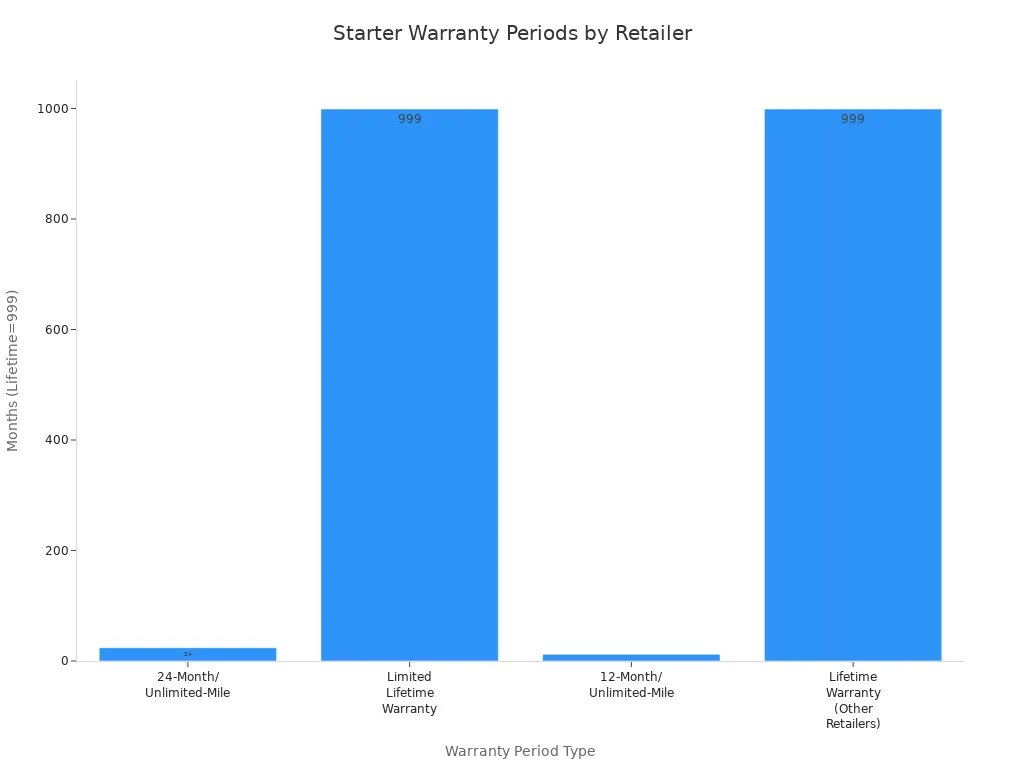
Consumer Reports and RepairPal say you should always check the warranty before you pick a starter replacement.
What's Covered
A starter replacement warranty usually covers the part and the work, but only if the shop gives you the starter and puts it in. If you bring your own part, most shops only cover the work, not future repairs. Here is what you can expect:
Coverage for the starter part, if the shop provides it.
Labor coverage if the starter fails during the warranty and the shop installed it.
Free repair if the starter fails during the warranty and the shop gave you the part.
Some shops give a one-year or 36,000-mile warranty. Others may give just 90 days or up to three years. Always ask for a written warranty and keep your receipts. This helps you avoid paying more if you need another starter.
The National Institute for Automotive Service Excellence (ASE) and Kelley Blue Book say you should read the warranty before you agree to a starter replacement. This protects you from surprise costs and helps you know what affects the price.
Signs You Need Starter Replacement
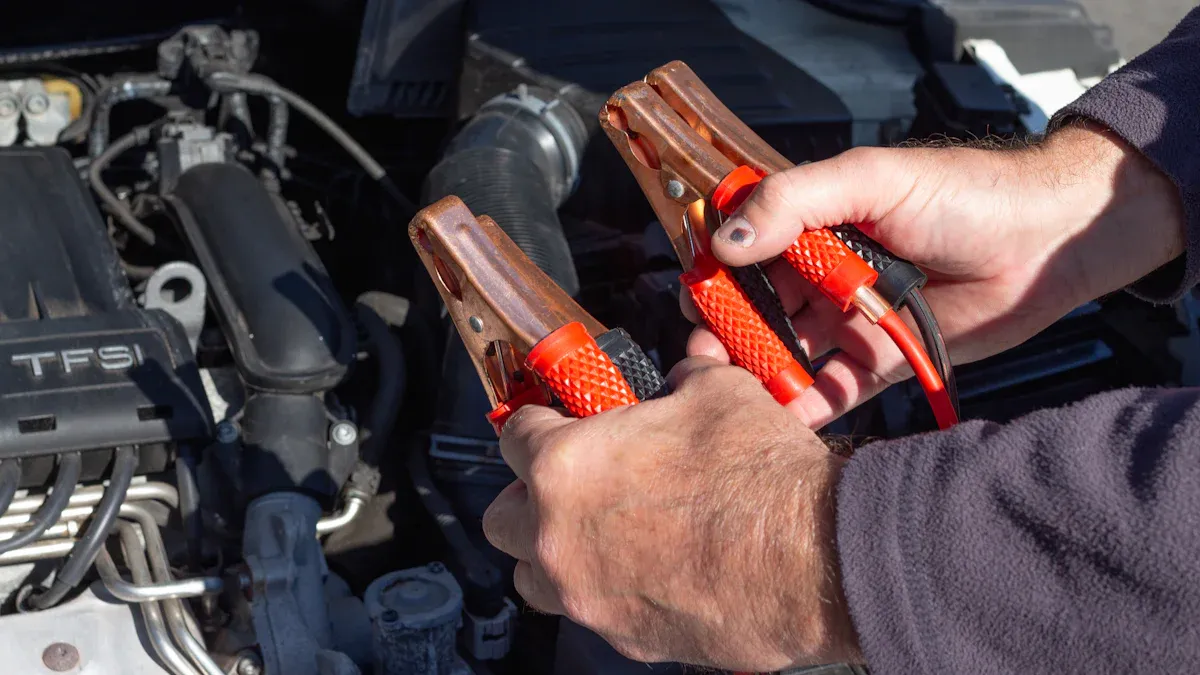
Image Source: pexels
Common Symptoms
You might see some warning signs before your starter fails. If you notice these signs early, you can save money and avoid getting stuck. Here are the most common things to watch for:
The dashboard lights come on, but the engine does not start.
You hear a clicking sound when you turn the key.
The engine turns slowly or has trouble starting.
Sometimes the car starts, but other times it will not.
You see smoke or smell something burning near the engine.
The lights inside the car get dim when you try to start it.
You hear grinding or whining sounds when you start the car.
The starter keeps running after the engine is on.
The starter looks wet with oil, which can come from leaks.
If you see any of these signs, you should get your starter checked soon. The National Institute for Automotive Service Excellence (ASE) says finding problems early can help you avoid bigger repairs and lower the cost of fixing your starter.
Confirming the Issue
You can check if the starter is the real problem by doing some easy tests. First, use a digital multimeter to check your battery voltage. It should be at least 12.2 volts. Clean the battery cables and ends to make sure they connect well. Next, do a voltage drop test between the battery and the starter. This helps you find bad connections that can look like starter problems.
Use a multimeter to see if power gets to the starter solenoid when you turn the key. If you see power at the solenoid but the starter does not work, take out the starter and do a bench test. This test shows if the starter motor is bad.
Symptom | Diagnostic Step | Recommended Action |
|---|---|---|
Test ignition switch and wiring | Repair or replace as needed | |
Clicking but no start | Check solenoid contacts | Clean or replace solenoid |
Slow or jerky cranking | Check battery and connections | Charge battery, clean terminals |
Grinding or whining noises | Inspect starter gear and ring gear | Replace worn parts |
Consumer Reports says you should go to a certified mechanic if you are not sure how to check or replace a starter. A professional can make sure you only pay for repairs you really need.
Starter replacement cost can be very different. It usually costs between $400 and $1,500. The price depends on your car and the work needed. Look at this table to compare costs:
Vehicle Type | Average Parts Cost | Average Labor Cost | Average Total Cost |
|---|---|---|---|
Honda Civic | $430 | $144 | $574 |
Ford F-150 | $319 | $88 | $407 |
BMW 750i | $735 | $741 | $1,476 |
When you plan for a starter replacement, think about these things:
How hard the job is
Where you get the work done and if the shop is trusted
Ask different shops for prices and check what their warranties cover. If you spot starter problems early, you can save money. Going to trusted places like YourMechanic and listening to ASE tips helps you make smart choices and spend less.
FAQ
How much does a starter replacement cost for most vehicles?
Most people pay $508 to $820 for a starter replacement. The price can go up to $1,500 for fancy cars. Kelley Blue Book and RepairPal say these numbers are right. Always ask your mechanic for a full price list before you agree to the work.
What affects the cost of a starter replacement the most?
The kind of car you have changes the price a lot. Labor can be easy or hard, which also changes the cost. Picking a new or rebuilt starter makes a difference too. Consumer Reports says luxury cars and hard-to-reach starters cost more to fix.
What are the signs you need a new starter?
You might hear clicking sounds or your engine turns slowly. Sometimes the engine will not start at all. These are signs your starter is bad. The National Institute for Automotive Service Excellence says to check these problems early so you do not pay more later.
Can you replace a starter yourself to save money?
You can change a starter at home if you have the right tools. Follow safety steps to stay safe. You only pay for the part if you do it yourself. Look for guides that show you how to replace a starter step by step.
How do you confirm if the starter is the problem?
First, test your battery to see if it works. If the battery is good, check if power gets to the starter. Listen for clicking or grinding noises. These sounds mean the starter could be bad. For a full check, ask a certified mechanic to help you know for sure.



